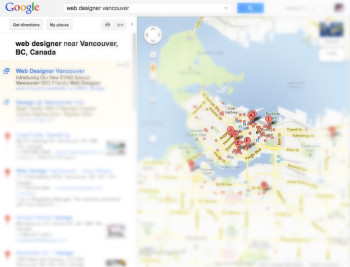local SEO: first steps to better Vancouver results
Warning: count(): Parameter must be an array or an object that implements Countable in /var/www/vhosts/blender.ca/httpdocs/wrdprss/wp-content/plugins/related-links-blender/includes/core.php on line 111
Local SEO (Search Engine Optimization) refers to search optimization with a regional focus, for instance targeting a city such as Vancouver. An example of local search engine optimization would be my website, Blender Design, targeting searches originating in the Vancouver metropolitan area. For a local business this means focusing SEO efforts to compete for the searches that matter most — potential local clients.
I’m sure you’ve already noticed that search results are tailored to the searcher. If a search engine, and by search engine I really mean Google, believes local search results would better answer a query, then local results will be prioritized. For instance, if you do a Google search for “best restaurant” you will likely see a couple of websites followed by a list of local restaurants. For many obvious local searches Google takes this a step further and includes an area map of results.
Getting Started with Local SEO — Address Please
As with all SEO campaigns you need to start with the basics, and there is nothing more basic for local SEO than ensuring that search engines know where you are located (e.g. your business, organization, event, person, place, or thing). The easiest and most effective way to do this is to provide an address on your website. Focus on:
- accuracy — make sure the address you use locates you without confusion or error. Check it in Google Maps and other online maps.
- consistency — choose a simple format and use it everywhere, every-time. This ensures search engines won’t divide their attention across several similar results.
- standards based — mark the elements of your address so that search engines can’t make a mistake. Tagged information is called structured data. More on this below…
Address Formatting for local SEO — Structured Data
Search engines will probably get it right if you include your business address in your website in a simple format, but why take the chance? Structuring the address data is easy(-ish) to do and Google might even reward you for your efforts. Things are about to get technical so some of you might prefer to share this post appropriately.
There are several ways you can mark up/structure/tag your address. A popular format is an hCard. Learn more at microformats.org. They also provide a tool for creating hCards. The hCard microformat builds on HTML by specifying classes to add to tags wrapped around the elements of your address. The following example of the simplified hCard for Stephen Drozdik with Blender Design will give you an idea of what the output of the hCard tool can look like:
<div id="hcard-Stephen-Drozdik" class="vcard"> <p><a class="url org" href="http://blender.ca/">Blender Design</a> / <span class="fn">Stephen Drozdik</span> <span class="adr"><span class="street-address">252 East 19th Ave</span> <span class="locality">Vancouver</span>, <span class="region">BC</span>, <span class="country-name">Canada</span>, <span class="postal-code">v5v1j2</span></span></p> <a class="email" href="mailto:stephen@blender.ca">stephen@blender.ca</a> <span class="tel">604-633-1211</span> </div>
After you have your encoded address you can add more classes to enable styling in your website, or include the microformat classes in your website’s style sheet. The resulting address from this code will look like the following:
Blender Design / Stephen Drozdik
252 East 19th Ave
Vancouver, BC, Canada, v5v1j2
stephen@blender.ca
604 – 633-1211
Another source for structured data supported by major search engines is schema.org. Schema.org is a collaboration between Google, Yahoo, and Microsoft so it deserves your attention. To quote Google, “Google doesn’t use markup for ranking purposes at this time — but rich snippets can make your web pages appear more prominently in search results, so you may see an increase in traffic.” Read more at schema.org, or for information specific to coding your address you can visit schema.org/organization.
Once you have added your encoded address to your website you can confirm it is properly structured by using Google’s structured data testing tool.
Summing Up — Local SEO First Steps
- Add an address to your website formatted with local SEO in mind
- Test that google recognizes your micro-formatted address
Now when search engines visit your website they will know where to geo-locate you in the real world. Next step: registering your business or organization with the major search engines.



 Local
Local 
I also found this interesting article where it explained a local keyword phrase. A local keyword phrase is generally one or two words combined with location that are used by advertisers in search engine optimization, or by visitors who are using search engines in a desire to find information based on that particular local phrase. For example, an advertiser that provides local plumbing services might use “Plumber Morristown, NJ” as a local keyword phrase to draw more visitors interested in the topic. On the other hand, visitors to a search engine looking to hire local plumber would also use the keyword phrase “Plumber Morristown, NJ” in the search engine, which would then match the local keyword phrase with websites like that of the advertiser that mention the same local keyword phrase.
It’s really simple; search engines like Google rank pages and you need to give them what they want to rank your page. To give them what they want you must provide the content that they’re looking for and send enough links to your pages to let the search engines know they are relevant and important.
And, never forget the local customer. It does you no good for a local search term if your content doesn’t include location you serve.
Note: search keyword phrases that are used in Meta Tags content are no longer frequently used by search engines to index pages. Major search engines such as Google no longer look for keyword phrases in the Meta Tags, and are more apt to use the information within the actual text of the web page. Listing the local keyword phrases in the in Meta Tags does not do any harm though, but is completely up to the website to whether they will use local keyword phrases in the in Meta Tags content.
Great information, thanks for sharing this article for us. Especially local SEO is very helpful for small business.